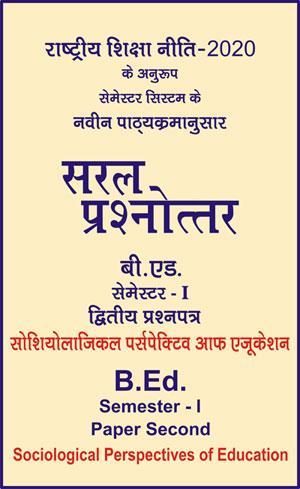|
बी एड - एम एड >> बी.एड. सेमेस्टर-1 प्रश्नपत्र-II - सोशियोलाजिकल पर्सपेक्टिव आफ एजूकेशन बी.एड. सेमेस्टर-1 प्रश्नपत्र-II - सोशियोलाजिकल पर्सपेक्टिव आफ एजूकेशनसरल प्रश्नोत्तर समूह
|
5 पाठक हैं |
|||||||
बी.एड. सेमेस्टर-1 प्रश्नपत्र-II - सोशियोलाजिकल पर्सपेक्टिव आफ एजूकेशन (अंग्रेजी भाषा मे)
Question- State the role of education in establishing unity in diversity for peaceful and collective living.
Ans.
Education is the key to uniting nations, bringing human beings closely together. In many parts of the world, civil society suffers because of situations of violent conflicts and war. It is important to recognise the crucial role of education in contributing to building a culture of peace and condemning instances in which education is undermined in order to attack democracy and tolerance.
A culture of peace and non-violence goes to the substance of fundamental human rights : social justice, democracy, literacy, respect and dignity for all, international solidarity, respect for workers’ rights and core labour standards, children rights, equality between men and women, cultural identity and diversity, Indigenous peoples and minorities rights, the preservation of the natural environment to name some of the more obvious thematic.
These are all issues of concern to EI and its member organizations, as reflected in many resolutions endorsed at EI World Congresses as well as at regional EI supported events.
EI affirms the right to peace and pledges its support for the peaceful resolution of conflicts and practice of non-violence through education, dialogue and cooperation.
In 2000, the then UNESCO Director General, Federico Mayor, stressed that “Education International is not only a vast repository of experience, it also has the know-how and talent to implement innovation and change for beyond what is normally found in government circles.
Education International and UNESCO can work together to achieve the common goals of an educated, intellectually curious and participatory culture of peace and democracy.”
Education is a key tool in combating poverty, in promoting peace, social justice, human rights, democracy, cultural diversity and environmental awareness. Education for peace implies an active concept of peace through values, life skills and knowledge in a spirit of equality, respect, empathy, understanding and mutual appreciation among individuals, groups and nations.
In its Constitution and resolutions, EI committed itself firmly to international peace activities linked to education promoting human rights and democracy and encouraging international understanding and solidarity. EI called on its member organisations to develop their advocacy in line with UNESCO’s Charter and aims, the UN Charter, the Universal Declaration of Human Rights and the International Convention on the Rights of the Child.
The educational action for promoting the concept of peace concerns the content of education and training, educational resources and material, school and university life, initial and on going training for teachers, research, and on going training for young people and adults. A culture of peace must take root in the classroom from an early age. It must continue to be reflected in the curricula at secondary and tertiary levels. However, the skills for peace and non-violence can only be learned and perfected through practice. Active listening, dialogue, mediation, and cooperative learning are delicate skills to develop. This is education in the widest sense. It is a dynamic, long term process: a life-time experience. It means providing both children and adults with an understanding of and respect for universal values and rights. It requires participation at all levels - family, school, places of work, news rooms, play grounds, and the community as well as the nation.
At the EI World Congress in 1998, EI and its affiliates placed on the record that they wanted “to take every opportunity to promote justice, world peace and education, in the interests of children of all countries.” As a token of EI’s commitment to a culture of peace, General Secretary Fred van Leeuwen, was one of the first to sign the Manifesto 2000 appeal and to support the International Year for the Culture of Peace.
In a resolution adopted in 2004, EI Resolution on Education for Peace, EI member organisations “pledged to promote education for peace and intercultural learning as the best antidote to racist and fundamentalist phenomena in order to prevent social conflict and the recourse to social violence.” In 2007, teacher organizations were also invited to promote peaceful behaviour in school environments through dispute resolution and peer mediation.
|
|||||














